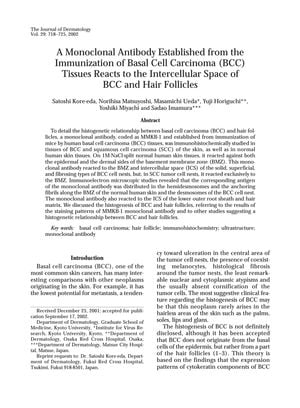A Monoclonal Antibody Established from the Immunization of Basal Cell Carcinoma Tissues Reacts to the Intercellular Space of Basal Cell Carcinoma and Hair Follicles
November 2002
in “
Journal of dermatology
”
basal cell carcinoma BCC hair follicles monoclonal antibody MMKB-1 squamous cell carcinoma SCC basement membrane zone BMZ intercellular space ICS lower outer root sheath hair matrix immunoelectron microscopy hemidesmosomes anchoring fibrils desmosomes basal cell carcinoma BCC hair follicles monoclonal antibody squamous cell carcinoma SCC basement membrane zone BMZ intercellular space ICS lower outer root sheath hair matrix immunoelectron microscopy hemidesmosomes anchoring fibrils desmosomes

TLDR The antibody created from BCC tissues reacts similarly to both BCC and hair follicles, suggesting BCC may come from hair follicle cells.
The study investigated the relationship between basal cell carcinoma (BCC) and hair follicles by using a monoclonal antibody, MMKB-1, which was developed from the immunization of mice with human BCC tissues. The antibody was tested on tissues from BCC, squamous cell carcinoma (SCC), and normal human skin. MMKB-1 reacted to the basement membrane zone (BMZ) and intercellular space (ICS) of BCC cell nests and to the BMZ of SCC tumor cell nests. Additionally, it reacted to the ICS of the lower outer root sheath and hair matrix in normal skin. Immunoelectron microscopy showed that the antigen targeted by MMKB-1 was present in hemidesmosomes and anchoring fibrils of the BMZ in normal skin and in the desmosomes of BCC cell nests. These findings suggest a histogenetic relationship between BCC and hair follicles, supporting the idea that BCC may originate from hair follicle structures.





